- Home
- Ralph Peters
Valley of the Shadow: A Novel
Valley of the Shadow: A Novel Read online
Begin Reading
Table of Contents
About the Author
Copyright Page
Thank you for buying this
Tom Doherty Associates ebook.
To receive special offers, bonus content,
and info on new releases and other great reads,
sign up for our newsletters.
Or visit us online at
us.macmillan.com/newslettersignup
For email updates on the author, click here.
The author and publisher have provided this e-book to you without Digital Rights Management software (DRM) applied so that you can enjoy reading it on your personal devices. This e-book is for your personal use only. You may not print or post this e-book, or make this e-book publicly available in any way. You may not copy, reproduce, or upload this e-book, other than to read it on one of your personal devices.
Copyright infringement is against the law. If you believe the copy of this e-book you are reading infringes on the author’s copyright, please notify the publisher at: us.macmillanusa.com/piracy.
For Katherine
Of the vineyards and the glens
How They Organized for War
The terms used to describe Civil War units can be confusing. This note is meant to help those new to military affairs grasp unit sizes and how units fit together.
The basic organization was the company. This was the soldier’s home, his wartime family. At the war’s outset, a company may have had one hundred or more soldiers. By the end of the war, some companies consisted of a half dozen men or simply ceased to exist. A company was supposed to be led by a captain, with lieutenants to assist him, but leadership casualties might result in companies commanded by a lieutenant or even a sergeant.
The regiment was the soldier’s extended family or clan. Asked to whom he belonged, a soldier would reply, “Sixty-first Georgia,” or, “Eleventh Vermont.” Regiments went to war with approximately eight hundred men. Some ended the war with fewer than a dozen survivors. A regiment was authorized a full colonel as its commander, but devastating casualties (especially late in the war) sometimes left a regiment under the command of a captain or even lieutenant.
The brigade united the regimental clans into a tribe. Strengths varied, but at the war’s outset the standard was between twenty-five hundred and three thousand men in four regiments. Due to attrition, by mid-1864 it wasn’t uncommon for a shrunken Federal brigade to contain five or six reduced-strength regiments, while some consolidated Confederate brigades included twice that number of severely battered regiments. Brigades were supposed to be commanded by brigadier generals (one star), but on the Federal side brigades frequently were commanded by colonels or even lieutenant colonels as field officers became casualties (promotions were more generous among the Confederates, and gray-clad officers from brigade through army levels generally held ranks one grade higher than their Northern counterparts).
Divisions consisted of two to three brigades (occasionally four or more in the Confederate States Army). A full-strength division fielded eight thousand to ten thousand soldiers, but by late 1864, divisions averaged between two thousand and five thousand men (Confederate divisions were fewer in number, but generally larger in size until the war’s closing months). A division was supposed to be commanded by a major general (two stars) and usually was in Confederate armies, but Union divisions most often were led by brigadier generals or, by 1864, even colonels.
A corps at full strength might have two, three, or more divisions, with an authorized strength of twenty-five thousand or higher. In the summer and autumn of 1864, when this account takes place, it was rare for a corps on either side to approach that number of troops present for duty. In the Confederacy, a corps was commanded by a lieutenant general (three stars). Among the Federals, a major general usually commanded a corps.
An army was, by doctrine, a force of two or more corps, but occasionally an independent maneuver force of two or three divisions was designated as an army. North and South, armies were given names based upon geographic features. The North preferred river names—the Army of the Potomac or Army of the Shenandoah—while the South employed regional names, such as the Army of Northern Virginia or the Army of the Valley. In the Confederacy, lieutenant generals or full generals (four stars) commanded armies. In the North, they were commanded by major generals. When given a third star, Ulysses S. Grant became the Union’s senior officer as a lieutenant general, while the South had a number of full generals. Armies varied widely in size, from well over a hundred thousand men to fewer than ten thousand, but the army remained the highest field organization on either side.
When the reader encounters the stand-alone term Army, thus capitalized, it refers to the Regular Army of the United States. By contrast, army is used when soldiers are referring to their own organizations.
Actual numbers of soldiers on any given battlefield can be infernally hard to determine, since records (especially among Confederates) could be spotty or were destroyed and because Yankees and Rebels counted men differently, with the Federals tallying each last cook, while the Confederates counted only those wielding weapons. Also, each side had different attitudes toward replenishing forces that had suffered casualties. Governors on both sides liked to create new regiments—allowing them to reward constituents with officers’ commissions—but the South was better about supplying individual replacements to veteran units, while the North continued to generate new regiments until late in the war. An important result was that even in 1864, a Confederate brigade or division might outnumber the Union brigade or division it faced, but the Union would bring to bear a greater number of brigades and divisions on the battlefield.
The cavalry generally was organized along the same lines as the infantry up through division. The term battalion applied to infantry or cavalry meant a unit about half the size of a regiment (a “demi-regiment”), or a regimental element deployed for a special purpose or tactic. While the formal maneuver battalion is the building block of today’s U.S. Army, it was an anomaly during our Civil War.
The artillery was organized into batteries of four guns in Confederate armies or six guns in Union formations. Batteries might be grouped into battalions, regiments, or even brigades, although the term regiment was most frequently used as a designator for “Regular Army” units in the North, so one might encounter Battery A of the 2nd U.S. Artillery.
Confused? Not as much as were the soldiers on those terrible battlefields.
(With special thanks to Brigadier General John W. Mountcastle, U.S. Army [Ret.], and Robert E. L. Krick for adjusting my fires.)
Therefore pride compasseth them about as a chain; violence covereth them as a garment.
—Psalm 73
PART
I
THE RIVER
ONE
July 6, 1864
Maryland Heights
Them shoes. Hard as skillet iron, as like to bust a man’s foot as cozy it going. Sturdy, though. Say that, and tell the truth. Better than none, and welcome. Call them “good.”
Nichols wished he could fix on that—he tried, he tried—the hard leather waiting to challenge flesh and bone, the side of fatback misery that attended every goodness in this life. But the frightful ache in his thigh had taken him captive, threatening him with unwanted, unmanly tears.
Which would not do none. Small he might be, but he would not be mocked by his fellow soldiers.
Around him, grease-faced men cleaned rifles.
He laid his hand gently atop the welt, as he might have soothed an ailing horse back on his father’s farm. He knew he had been lucky, but knowing didn’t ease the ache one mite. That pain was a brimstone torment, a
tribulation. Still, he would not ride an ambulance wagon. Not that.
New shoes tucked beside him, he sat stripped bare but for a shirt that covered all such a meager garment might. Again, he touched the purple welt with its sickly yellow edges, swelling from his thigh, a thing unholy. He’d thought in that first instant that his leg must surely be shattered and torn right off, when whatever it was that hit him knocked him back, over, and down. Rolling in the summer wheat, he had grasped his wound with both hands to choke the pain. Only to find that his trouser leg—its wool worn thin as finery—had not even been rent. No blood smeared his hands, no poke of bone emerged. Helped to the rear, he had been further astonished to find he could almost walk.
But, oh, it hurt like Satan’s own revenge.
And now he sat, petting the monstrous bump in half-dazed wonder, surrounded by ramrod clank and joshing men complaining gaily about their just-got shoes. Each man was pleased enough to get them, even those who had come to prefer going barefoot, but soldiers always complained. More than just a let-out of a man’s feelings, it was a duty.
Sinful late, neglectful, ashamed, he thanked the Lord for his preservation. How could a man slight God at such a time?
Man, in his pride and selfishness, was a wicked beast. Ungrateful in the hour of his deliverance.
They’d harried the Yankees back into their trenches up on the Heights, work as hot as a midsummer harvest and this here batch of blue-bellies stubborn as mules put into a strange harness. But General Gordon, a righteous man in the eyes of the Lord God, was wise in the ways of war, in ways concealed to lesser men. And Gordon, or maybe even Old Jubilee himself—chaw of tobacco a cow’s cud in his mouth and juice gleaming in his beard, General Early a spitting, crook-back man and harsh-mouthed as a heathen—such high men knew when it made no sense to chase after Yankees who weren’t going to be no bother. Truth be told, the fighting had not raised half the ruckus, not a quarter, of the arrival of the supply wagons beforehand, bringing shoes that had been promised since Staunton.
As soon as he fitted his feet to the brute leather, Nichols had grasped that he’d have to cut the toes free or suffer the pains of a blasphemer gone over Jordan, and he’d left the shoes behind during the attack. It was as if he’d had the gift of the sight, since the shoes, at least one, must have been lost when that spent piece of shell or whatever it was knocked him down. And the shoes had been there waiting for him, faithfully, betrothed, when Lem Davis eased him to the ground in the shade they’d left to go fuss with the Yankees.
Sturdy shoes, they’d do. Nichols tried to look on the good side of things. Perfection was the dominion of the Lord, not Man the Fallen. And that was just how it was, always: a plump sergeant perched on a wagon, throwing something or other at you, hitting you smack in the chest, and your business was to be grateful. For shoes hard as the blades of a plow or for powder poorly stored, for provender lively with vermin—although he’d heard tell that a right wealth of Yankee rations had been captured at Charles Town and might be shared out soon.
The shoes would take softening and molding to the foot, the seasoning of sweat and the grumpy baptism of creek crossings—although a man had to be watchful of the foot rot marching wet. At least he had two feet attached to two legs still attached to his mortal flesh, a wondrous thing. Was that the sort of miracle of which the Good Book spoke?
He touched his curious wound again, unable to resist, and winced at its worsening.
“You just count your blessings, Georgie,” Lem Davis said with a kindly twist of smile.
Nichols mumbled and nodded, pulling another tick off his calf, crushing it. Ticks seemed as bad in Maryland as in Virginia, and rolling around in the grass had not been helpful. But he was grateful for Lem’s brotherly tone, for all of his fine brethren, the men of Company D and the rest of the 61st Georgia, no regiment in the whole great army none better, these hard-worn fellows grouped in the shade about him now, complaining not of the short, sharp fight behind them, but pleasurably of the shoes for which they had yearned on the withering marches down the Valley Pike.
Every man in the infantry hated that thoroughfare. Topped with rough Mack Adam and rendered not fit for foot of man or hoof of beast, a plain misery, it was a boon to the wagon wheel and artillery, whose cannoneers never had to march one step but rode about like princes. “Progress,” that was the word the Pike called up, the rich man’s delight in newfangledness. Such progress was just for the purse-proud man with the golden pocket watch, for the man from the bank holding papers that made no sense. It was not the wonderful sort in Pilgrim’s Progress, his father’s great, green book—tattered, treasured—second only to the Good Book itself in its worth to a man’s soul. He wished he could read it now, that book, right here in the shade that shielded a man from the sun’s direct attack, but not from the flanking movements of the heat in this no-place place, here on the brim of Yankee-land, no cooler than scorched Virginia, where it had not rained, he believed, since the scrap on the North Anna, where Joe Cruce fell. And on their long, unshod, hot, northerly marches, his warrior brethren, not unwilling but unable, had fallen before they heard a single shot, collapsing, gone down into delirium, clammy and startlingly cold to the touch, fish caught from a fast stream with bare hands. Dying far from the battlefield. Or merely squatting distempered by the roadside.
Skirmishers pecked the afternoon. Would they be ordered in again? Against those fortified Heights? Was there anything up there worth men’s blood? General Gordon was a pondering man, erect in body and spirit, but with General Early a fellow never quite knew. Humped over and given to temper—every man in the army had witnessed at least one memorable outburst—Old Jube had a touch of the cottonmouth’s meanness about him. And Nichols had heard that General Breckinridge, a high politician fellow, had been stirred into the batter, in between Gordon and Early. Some said Old Jube was slapping Gordon’s face, doing him down, although Nichols preferred not to think that. There wasn’t a man who didn’t admire John Gordon, commander of their brigade and now their division. He seemed an honest Christian, which might not be the case with General Early.
Nichols probed his thigh again and soon jerked back his hand, as if he had grasped hot iron from a forge. Would he be able to march, when the march resumed? He would not shirk, nor be eyed as a malingerer. He had come too far and endured too much to be mocked as a “hospital hero” once again.
He shut his eyes hard, not at the leg pain this time, nor at the face-pestering flies, but at the recollection of almost dying in the Danville hospital, in that filthy pesthouse of Damnation, the worst of those through which he had been passed like a thing unwanted, a boy not yet tested by battle and sickened unto death by the bloody trots. At one point, his weight had been shy of ninety pounds.
Compared with those hospital wards, war was a pleasure. And this hard jaunt into Maryland, perhaps even farther on into the North, was a downright joy compared to the soul-busting misery of the fighting from the Wilderness through Cold Harbor. He hoped never to see the like of the Mule Shoe’s mud and savagery again. Then the plague had been of rain, not drought, and the queer thing was that two of his friends, Joe Cruce and Bill Kicklighter, had been killed not amid the horror of the Wilderness or the confusion of Spotsylvania, but along the North Anna, in the least of the fighting.
It had been a relief to march away from all that, to cross the high green mountains into the Valley. Even the dust through which they had marched seemed fresh compared to what they left behind. That man Grant. A murderer, surely. Moloch.
At Spotsylvania, the Seventh Seal had been opened. He had put a bayonet into another man’s belly. Once, then—meanly—again. The bewildered look on the fellow’s face, the amazement and disbelief, had made Nichols want to grin and vomit at once. The chaplain’s words thereafter held no comfort.
He didn’t want to burn in Hell for eternity. But he wasn’t going to kneel to Yankees, either.
Skin hot and tight to bursting over his welt, he thought again of the
Valley Pike, of its meanness to rag-wrapped feet, but beloved of the generals for its directness, an arrow pointed north. Where were they going this time? No one told them, ever. Not General Evans, Christian though he was. And not General Gordon, who could make the poorest soldier feel exalted. And surely not General Early, a profane man, spitting his sour tobacco juice and judging the world in words that befouled the air, a hard man he. They said Old Jube had not wished to leave the Union, but now hated Yankees like farmers hated blight. Who knew the workings of another’s heart? Jesus, only.
Squatting by a got-up coffee fire, Dan Frawley rasped, “If they done went to all this bother to bring shoes up from Virginny, all that way … tells me we’re meant to do a sight more marching.” He shook his head gravely. “Nothing but trouble ahead, boys, take your pleasures now.”
In response: dry-throated acknowledgment that fell well short of laughter.
“Could use a tad more water in the pot,” Frawley added, pushing clotted red hair behind an ear. “Starting to think Corporal Holloway skedaddled with those canteens.”
Holloway, Tom Boyet, and the rest of the water detail were overdue, and every man sprawled in the shade was thirst-caught, beat-down, and still, dirty men with gleaming rifles, as always. Would they take another crack at those Yankees in their high trenches, waiting like rattlesnakes up there in fortifications they’d had years to prepare? Or would the generals decide to move along? Deeper into the rich realm of the Philistines? And let this particular nest of serpents be? The logic of generals passed all understanding.
“I do believe we’re going to Pennsylvania,” Lem Davis said, Lem of the Patriarch’s beard and gentle heart, young wife dead of childbirth in his absence. “Dan, you cook up coffee slower than any man alive.”

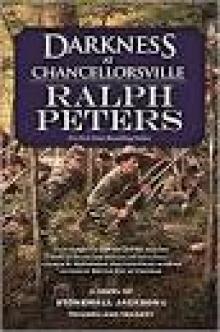 Darkness at Chancellorsville
Darkness at Chancellorsville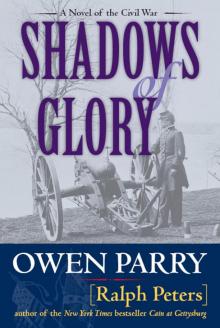 Shadows of Glory
Shadows of Glory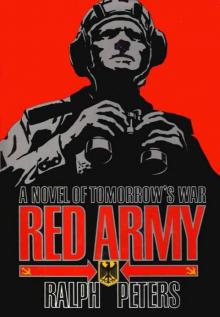 Red Army
Red Army Cain at Gettysburg
Cain at Gettysburg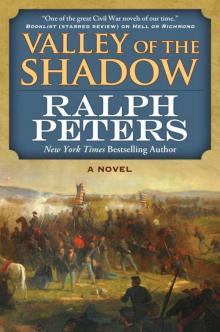 Valley of the Shadow: A Novel
Valley of the Shadow: A Novel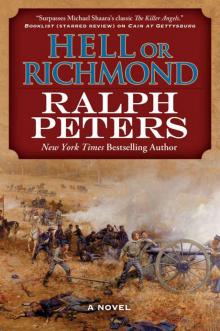 Hell or Richmond
Hell or Richmond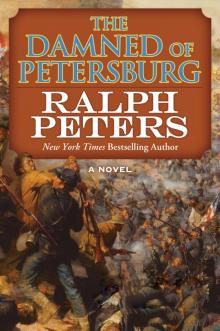 The Damned of Petersburg
The Damned of Petersburg The War After Armageddon
The War After Armageddon The War in 2020
The War in 2020